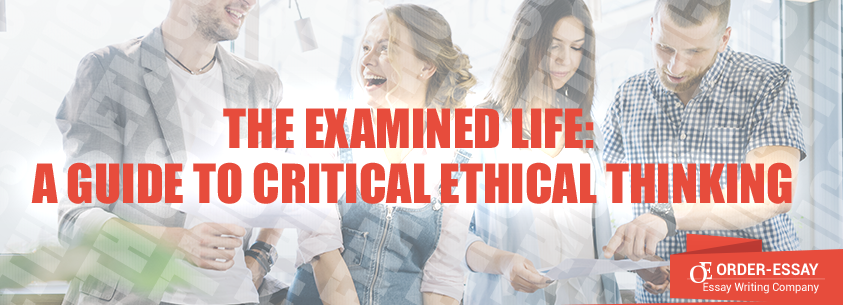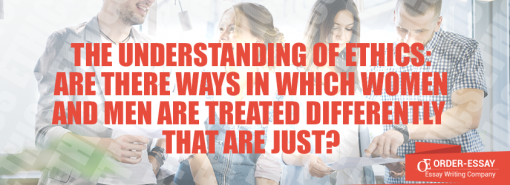
Introduction
Humans are required to act constantly in an ethical manner and show respect and dignity to other people. In fact, individuals can demonstrate that they lead a moral life through several ways. Some of them include thinking critically, avoiding assumptions, and recognizing unethical thinking among others. The current paper aims at exploring four different theories of critical ethical life, by addressing their importance and how they are associated with human dignity, respect and doing the right things. It also addresses conceivable problems that might arise during the application of these theories.
Justifying Beliefs and Decisions
Justifying beliefs and decision means outlining reasons that show why an individual has chosen to act or think in a certain way. When providing a rationale for the decision, a person may use either personal or moral reason.
Importance of the Issue
The concept of justifying beliefs and decisions is ethically important, because people are required to involve moral considerations. In some situations, when people justify their actions, they use personal reasons, which are usually biased. What is right to one person may be wrong to another, because personal thinking is affected by a specific situation, circumstances and surrounding people. However, moral reasoning is always the best way of verifying actions, because it is done in a careful manner, rationally, and with honest reflections. When a justification is done using moral reasons, it appeals to most people as it is always in line with the principles of ethics. The above-described theory is thus important, because it shows people why people need to justify their beliefs and decisions using an ethical framework of moral reasoning rather than utilizing personal reasons.
Relation to Human Dignity, Respect and Doing the Right Thing
When the process of justifying beliefs and decisions is done using personal reasons, it can result in wrongdoing, which can negatively affect human dignity and respect. A decision determines the end results, and thus if it is wrong, so are the consequences. When the outcomes are bad, then they are not consistent with human ways of life, and thus can lead to the lack of respect for people’s lives. For example, if a person decided to kill another individual because he was rude, then his/her behavior could only be justified by personal and not moral decisions. The result is that the justification of the determination to kill another person leads to wrongdoing and disrespect to other people’s lives. However, when justification is done using a moral reasoning, it is always accompanied by right actions that show dignity and respect to others.
Problems That Might Arise
As for me, the problem that might arise with this theory is the dilemma of making a choice between what is best for me and what is good for the people involved. Personally, I am usually more tempted to make a decision and justify it based on what is best for me and not on what is good for others. Such action can be a huge problem, because it creates a conflict of interest.
Exploring Ways Unseen
Exploring the unseen way means living a life that is examined; a life in which a person has to look at the possible outcomes in the future.
Importance of the Issue
The importance of living an examined life makes people have an open mind and be ready for future issues that are not taking place today. Forecasting the future makes people familiar with possible challenges and circumstances despite their current status. Such habit is beneficial because it prepares people for making decisions on possible issues in the future in an informed manner. Seeing beyond the obvious also helps people avoid the common stereotypes, which are mostly misguided and lack proper thinking. In fact, such practice also enhances people’s thinking, allowing them to see things beyond norms of categories and common ways of separation. Overall, exploring ways unseen ensures that people have a healthy degree of skepticism, which makes them not hasten into making decisions, but gives time for a second thought to form a broader approach.
Relation to Human Dignity, Respect and Doing the Right Thing
Looking at decision-making process and concerns of the society with an open mind is advantageous as it ensures that people make informed resolutions. When such practice is applied, a decision reflecting exceptional reasoning emanates; hence, the aftermath actions are likely to follow the rules that preserve human dignity and respect. Exploring ways unseen also provokes the sense of doubt when making a decision, and thus the choice is usually less ambiguous. Therefore, such decision is most likely to be universally acceptable, and result in a person doing the right thing. In general, the above theory relates to human dignity, respect and doing the right thing because it leads to open-minded thinking and skepticism, which end in ethical decisions.
Problems Associated With the Theme
The idea of exploring ways unseen sometimes leads to particular problems, if the practice is not done as required. First, if individuals ignore this practice, it can lead to making rash decisions, which always result in wrongdoing. Such incorrect thinking can also make a person to hurt others either physical or emotionally. Lack of practice can also lead to categorization and stereotype, which are an unethical way of perceiving others. Another problem that might arise is the degree of skepticism employed by an individual. If a person is too skeptical, then he/she is likely to make a decision, which is unethical and can offend others.
Avoiding Errors of Relevance
Any ethical or right decision must be relevant to its conclusion. In other words, the decision must be appropriate to the issue that is being evaluated.
Importance of the Issue
Avoiding the errors of relevance is an important theory due to several reasons. One advantage of engaging into this practice is that it ensures that the evidence given is evaluated based on arguments rather than the person involved. Most spontaneous decisions are made based the on the status of an individual in the society, rather than on what he/she says. It is wrong, because the evaluation is biased and unproved. For example, a teacher’s argument about a pupil should be evaluated based on facts, but not on the fact that a teacher has more information about the student. Avoiding error of relevance is also important because it ensures that arguments remain within the topic. When judging a situation/person, it can be very wrong to consider things that are not covered in the particular case, as it can lead to unfair treatment. This practice thus ensures that only things that are important to the particular circumstances are considered, omitting irrelevant information.



How It Relates To Human Dignity, Respect and Doing the Right Thing
Avoiding error of relevance is related to human dignity, respect and doing the right thing, because it promotes moral values. First, when the evidence is based on relevant issues, it results in fair judgment. In fact, an appropriate judgment is a conclusion that is morally acceptable based on all principles of ethics; hence, such judgement automatically leads to doing the right thing. On the other hand, judging people fairly without any discrimination or prejudice that can be encouraged by trusted authorities shows a lot of respect and dignity to the people involved, as they are treated humanely. Avoiding errors of relevance thus ensures that correct decisions are made at all times, and that those decisions are in line with ethical principles.
Problems That Might Arise
As for me, the first issue that arises from practicing making error of relevance is that I am going to violate the ethical principle that is accorded to others. That practice is thus going to make me have a personal blame on the judgment, which I make towards others. To others, use of error of relevance will make them incur losses, which they do not deserve. For example, if I judge my friend based on what her parents have said about her without evaluating their argument, and then I am likely to lose respect towards her, what can negatively affect her reputation.
Avoiding Errors of Evidence
An error of evidence occurs when a decision or judgment is made based on a wrong or an inappropriate evidence.
Importance of Avoiding Errors of Evidence
Such errors should be avoided because they result in a particular type of unethical practices, which are not put into consideration when making decisions. The first evidence that has to be avoided is the hasty induction, or generalization. For example, just because black men are associated with drugs, it is incorrect to state that a black person is in a company of drug dealers and is a drug dealer. Therefore, avoiding errors of evidence is important, because it stops such kind of generalization. The practice also prevents the exclusion of important issues, which can establish the truth about the situation. For example, if a police discovered a body of a killed person at his home, and the forensic investigation identified two DNAs of different individuals different from the victim’s blood, then it would be wrong only to charge one person with the crime, and not to mention about the other DNA. Thus, this practice is important, because it helps prevent errors of evidence.
Get a Price Quote
Relation to Human Dignity, Respect and Doing the Right Thing
Avoiding errors of evidence has a strong relation to the human dignity, respect, and doing right, because it raises an ethical issue when giving or using evidence. A shred of evidence is always necessary to justify an action or to make a decision about something; hence, it is significant that such evidence is based on moral and ethical principles to ensure its correctness. Having valid evidence also means making the right judgment, what leads to doing the good thing. A person who is also judged with evidence that has errors can feel that he/she is denied the respect he/she deserves and that his/her dignity is violated. In other words, avoiding the errors of evidence, when making decisions or judgment, makes people feel respected and dignified.
Problems Associated with Avoiding Errors of Evidence
When the errors of evidence is not avoided, it can lead to several problems both for the individual making a decision and for others. First, such practice can make others be judged unfairly either in the legal or casual surrounding. Such unfair judgment can hurt others as it can defame them, make them go to prison or pay a huge sum of money, and even push them to lose their jobs and properties. The users of the evidence with an error on the other hand also risk being blamed by the society, if it is identified that he/she has used wrong evidence.
Conclusion
In conclusion, the paper has evaluated four different theories that demonstrate critical ethical life, by exploring their importance and how they are related to human dignity, respect and doing the right things. Additionally, the possible problems that arise due to the utilization of these ethical principles have been discussed. It has been revealed that justifying beliefs and decisions, exploring ways unseen, avoiding errors of evidence, and avoiding errors of relevance relate to ethical framework and, thus, are important in moral thinking. Moreover, they all lead to human dignity, respect and doing the right thing when used in making decisions. Lastly, they can cause the problem of misjudgment if not applied as required by ethical principles.








